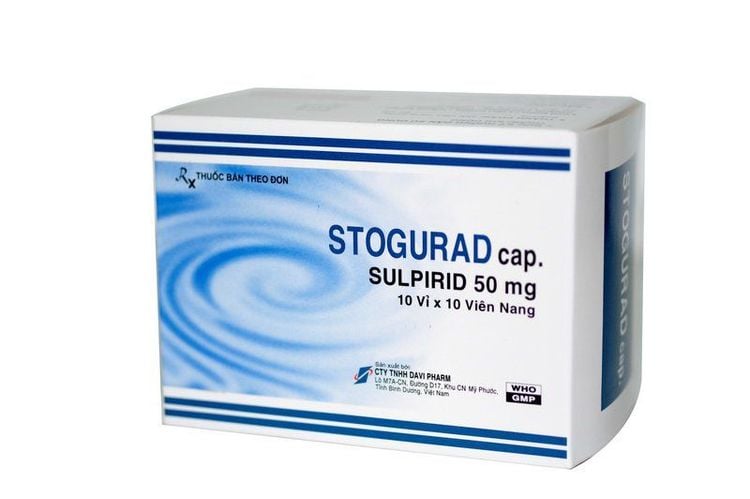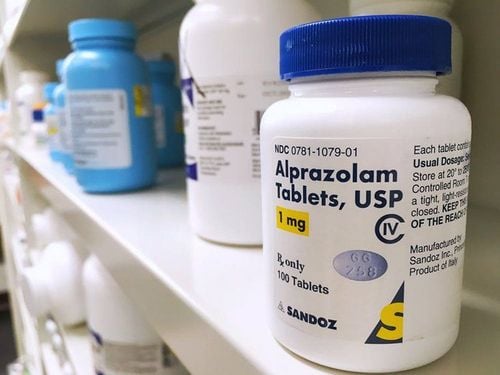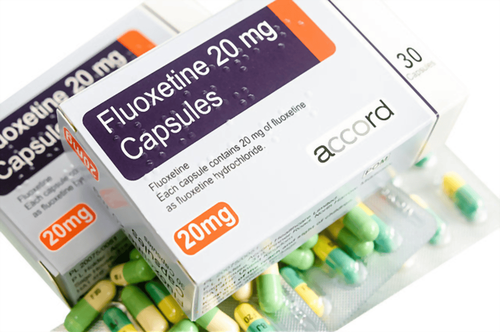This is an automatically translated article.
Stoguard drug has the main active ingredient is sulpiride, a D2 receptor blocker in the brain thereby having anti-psychotic effects. The following article will provide readers with some general information about this drug.
1. What does stoguard do?
Stoguard medicine contains the main ingredient is Sulpiride with a strength of 50mg. Sulpiride belongs to the group of benzamides, has selective blocking effects of dopamine D2 receptors in the brain, thereby having anti-psychotic ability. Sulpiride can be seen as an intermediate between antidepressants and neuroleptics. In contrast to most other neuroleptics that block both dopamine D1 and D2 receptors, sulpiride has a more selective effect on dopamine D2 receptors. Sulpiride has no effect on receptors such as histamine, norepinephrine, serotonin, acetylcholine, or gamma aminobutyric acid (GABA). Stoguard is indicated for use in the following cases:
Symptomatic treatment of anxiety in adults Severe behavioral disorders in children over 6 years of age
2. Dosage of the drug Stogurad
Sotgurad is taken orally. The specific dosage in each case is as follows:
Adults: Treatment of symptoms of anxiety with the usual dose of 50 - 150 mg/day for up to 4 weeks. Children with severe conduct disorder: The usual dose is 5 to 10 mg/kg/day. In children, it is more appropriate to use oral solutions. The above dosage is for reference only. The specific dose depends on the condition and severity of the disease. You need to consult your doctor or medical staff to get the right dose.

Thuốc Stogurad là loại thuốc có khả năng chống rối loạn tâm thần
3. What to do in case of an overdose of Stogurad?
Data on sulpiride overdose are currently scarce. An overdose of the drug can cause dyskinesia with dystonia of the tongue and stiffness of the jaw. Some patients have a more severe Parkinson's-like syndrome, a neuroleptic syndrome. There is no specific antidote for sulpiride poisoning, mainly symptomatic treatment including cardiovascular resuscitation, respiratory support, continuous patient monitoring. If signs of severe extrapyramidal syndrome are present, anticholinergics may be used.
4. What are the side effects of Stogurad?
Side effects of the drug Stogurad include:
Common, ADR ≥ 1/100
Endocrine: Increased prolactin secretion, increased lactation, menstrual disorders Neurologic: Insomnia or drowsiness, Parkinson's symptoms, tremor, . Skin and subcutaneous tissues: A maculopapular rash. Liver: Increased liver enzymes. Genitourinary system: Breast pain. Other: Weight gain. Uncommon, 1/1,000 ≤ ADR < 1/100
Blood: Leukopenia. Neurological: Movement disorders, increased muscle tone, dystonia. Cardiovascular: QT interval prolongation (causing arrhythmias, torsades de pointes), orthostatic hypotension Gastrointestinal: Increased salivation. Genitourinary system and mammary glands: Enlarged breasts, amenorrhea, abnormal orgasm, erectile dysfunction. Rarely, 1/10,000 ≤ ADR < 1,000
Endocrine: Enlarged breasts in men. Nervous system: ophthalmoplegia, tardive dyskinesia. Cardiovascular: bradycardia or arrhythmia Other: Hypothermia, photosensitivity Frequency unknown
Blood: agranulocytosis. Mental: Confusion. Neurological: decreased mobility, neuroleptic malignant syndrome, tardive dyskinesia, convulsions. Cardiovascular: cardiac arrest, torsades de pointes, sudden death. Vascular: deep vein thrombosis, pulmonary embolism Musculoskeletal: Neck curvature, jaw stiffness. Other: Extrapyramidal symptoms, neonatal withdrawal syndrome due to maternal drug use, anaphylaxis, dyspnoea, urticaria, hypotension and anaphylaxis

Thuốc Stogurad có thể gây ra một số tác dụng phụ cho người sử dụng
5. Contraindications of the drug
Sotgurad is contraindicated in the following cases:
Hypersensitivity to sulpiride or any other ingredient of the drug. Acute porphyria metabolism disorder. Prolactin-dependent tumors are pheochromocytomas Central nervous system depression, coma, neuroleptic and alcohol toxicity. Are taking medications such as levodopa, ropinirol, and quinagolid
6. Notes when using Stogurad
An increase in motor excitability has been reported with high doses of Stogurad in some patients. In addition, during the inflammatory phase of the disease process, low doses of sulpiride may aggravate symptoms of the disease. Extrapyramidal reactions, mainly malaise or restlessness, have been reported in rare cases. Venous Thrombosis: Several cases of venous thrombosis during treatment with antipsychotics have been reported. Because patients treated with antipsychotics often have associated thrombotic risk factors. Therefore, all possible risks of venous thrombosis should be identified before and during sulpiride therapy and appropriate thromboprophylaxis measures should be instituted. Breast cancer : Sulpiride may increase prolactin levels, therefore caution should be taken in patients with a history or family history of breast cancer Elderly patients: The elderly are more susceptible to adverse effects. such as orthostatic hypotension, sedation, and extrapyramidal reactions. Drugs may increase mortality in elderly people with dementia. Information from two large observational studies shows that elderly people with dementia treated with antipsychotics have a small increase in mortality. There is no information available to make an accurate estimate of the risk, and the cause of the increased risk is unknown. In general, sulpiride, as with other sedatives, should be used with caution in elderly patients. In children: The efficacy and safety of sulpiride have not been adequately studied in this population, so caution should be exercised when administering Stogurad to children. Seizures: Sedatives may lower the seizure threshold. Convulsions have been reported in some patients with no prior medical history. Caution should be exercised when administering the drug to patients with unstable epilepsy and patients with a history of seizures. In patients requiring sulpiride while on antiepileptic therapy, the dose of antiepileptic drug should not be changed. Sulpiride has anticholinergic effects and therefore caution should be exercised in patients with a history of glaucoma, congenital gastrointestinal narrowing, intestinal obstruction or prostatic hyperplasia. QT prolongation: Sulpiride may prolong the QT interval and may lead to serious ventricular arrhythmias such as torsades de pointes. Before using the drug and depending on the clinical condition of the patient should be monitored for factors that are favorable for the occurrence of cardiac arrhythmias, including: heart rate slower than 55 beats/min, special electrolyte disturbances are hypokalemia, congenital prolongation of the QT interval, treatment with drugs known to slow the heart rate, etc. Sulpiride should be used with caution in patients with the above factors and in patients with cardiovascular disorders. may lead to QT prolongation. Sulpiride should be used with caution in hypertensive patients, especially in the elderly population, due to the risk of hypertensive crisis. Blood glucose should be monitored in patients with diabetes mellitus or at risk of diabetes when initiating sulpiride therapy. Renal impairment: For patients with renal impairment, the dose of sulpiride should be reduced and frequent monitoring is required. If renal failure is severe, drug therapy should be administered in intermittent intervals. Ability to drive and use machines: Sulpiride has a sedative effect that may affect the ability to drive and use machines. Therefore, patients need to be careful while taking the drug. Pregnancy: Animal studies have not shown direct or indirect adverse effects of the drug on embryonic development and/or postnatal development. Currently, there is limited information on the use of the drug during pregnancy. Therefore, the use of sulpiride during pregnancy is not recommended due to lack of information. Lactation: Sulpiride has been found in breast milk, so breast-feeding is not recommended while taking this medicine. Drug Interactions: Stogurad can interact with many other drugs and cause many dangerous side effects. Therefore, before using, please read the instructions carefully before use and discuss with your doctor, pharmacist.
In summary, Stogurad is possibly indicated for the treatment of anxiety disorders in adults and severe behavioral disorders in children over 6 years of age. The drug can cause many dangerous side effects, so patients should not self-medicate, but should consult a medical professional before use.
Please dial HOTLINE for more information or register for an appointment HERE. Download MyVinmec app to make appointments faster and to manage your bookings easily.













